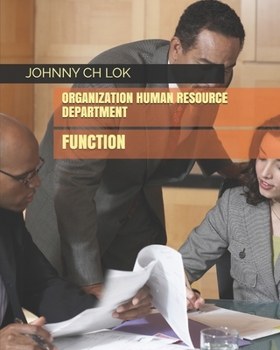Organization Human Resource Department: Function
Knowledge management at hotel industryHotels' realization led to the design and implementation of a computerized knowledge library that was accessible to every site manager in every hotel across the Australia/South pacific/ South East Asia region. The system was designed to initiate a long-term knowledge-sharing culture by making it easier to share value-added practices and processes, thus reducing wastage of time and resources through replication.The problem- The knowledge library operated as a two way system whereby managers could both add ideas or effective innovative practices and find solutions to some of their own operational problems that demanded new ideas or innovation. To simplify its use, the system was designed to store ideas by hotel function ( that is food and beverage, housekeeping etc.) with both functional and key word search tools available, knowledg transfer was considered to have occured once an idea had been implemented at another site.Hotel management realized that they would need to create support systems to motivate sharing between the sites and geographical regions. This opened up an opportunity to achieve the desired knowledge, sharing actions and behaviors. Throughout the performance management system, as a result, for each site manager to pass their annual performance review, they had to retrieve a minumum of two ideas from the system and implement these in their hotel, as well as add two ideas to the system for others to be able to access and use.The idea that the hotel different site managers' knowledge and expertise can play a strategic role in achieving competitive goals to expect to achieve a strategy results in superior performance, or a competive advantage. Achieving high performance, improving employment skills, pay-for -performance, profit sharing, performance appraisal, teamworking, job evaluation, information-sharing, employment security, selective hiring, self- managed teams or teamworking, high pay contingent on company performance, extensive training, reduction in status differences, information sharing( knowledge management) benefits.Manpower planning role in HOTEL SERVICE ORGANIZATIONManpower planning ( workforce planning) means personnel and HR managers need to ensure that necessary supply of people was forthcoming to allow targets to be met. In theory at least, a manpower plan could show how the demand for people and their skills within an organization could be balanced by supply. The idea of a balance between demand and supply reflects the influence of the language of classical labor economics, in which movement towards an " equilibrium" serves as an ideal.The utilization, improvement and preservation of an organization's human resources. The four stages of the planning process may include: the first stage is an evaluation or appreciation of the existing manpower resources. The second stage is an estimation of the proportion of currently employed manpower resources that were likely to be within the firm by the forcast data. the third stage is an essessment or forecast of labor requirements needed if the organization's overall objectives were to be achieved by the forecast date and the fourth stage, it needs to measure to ensure that the necessary resources were available as and when required that is the manpower plan.There were two main reasons for companies to use manpower planning. To develop their business objectives and manning levels and to reduce the " unknown" factor. Firstly organization implements strategy and targets, it brings organization practices and methods, it brings manpower review and analysis ( internal and external factors), it brings forecast ( demand and supply), it brings adjust to balance ( recurit, retain and reduce).
Format:Paperback
Language:English
ISBN:B08HRZSYDV
ISBN13:9798683340421
Release Date:January 1
Publisher:Independently Published
Length:144 Pages
Weight:0.90 lbs.
Dimensions:0.4" x 8.0" x 10.0"
Customer Reviews
0 rating





